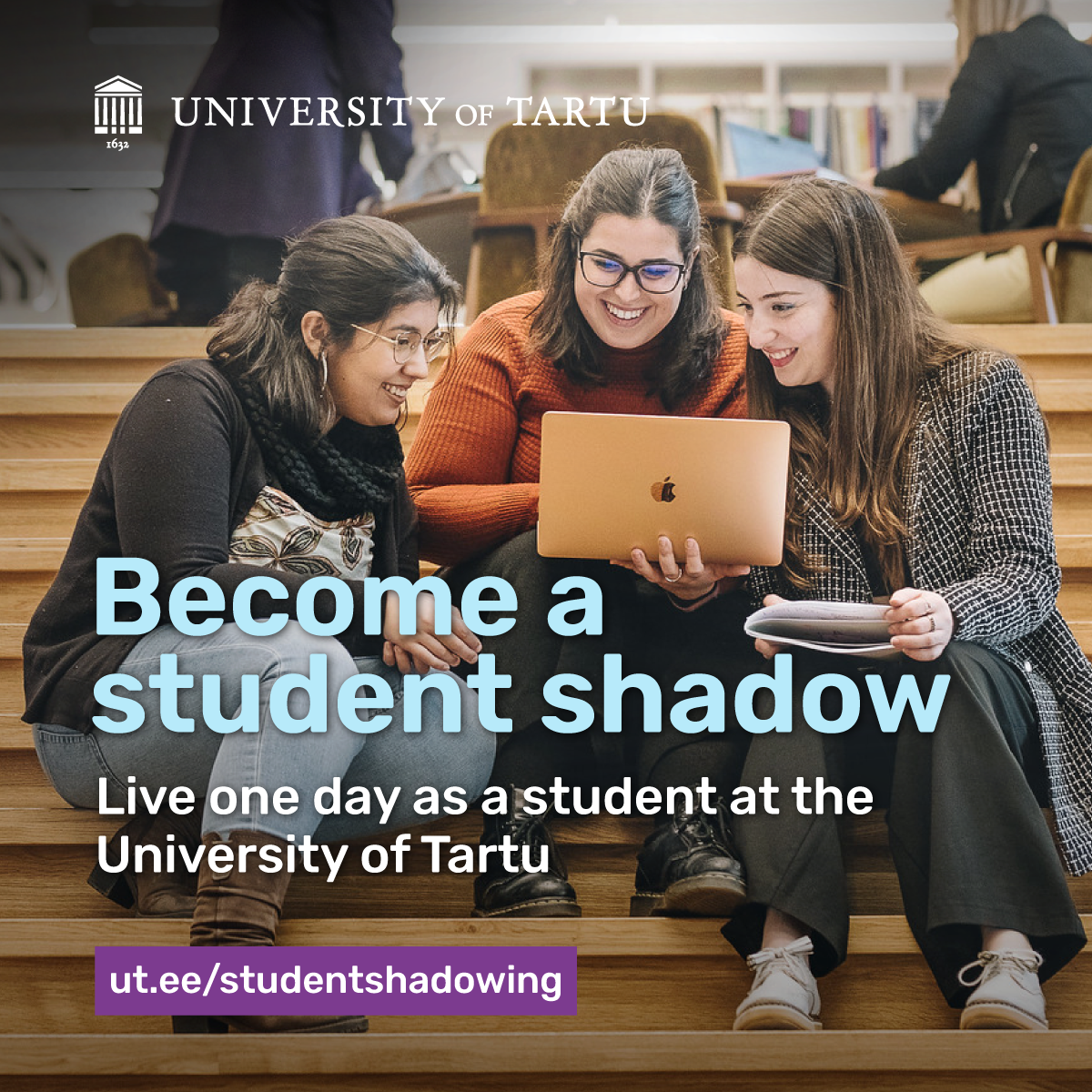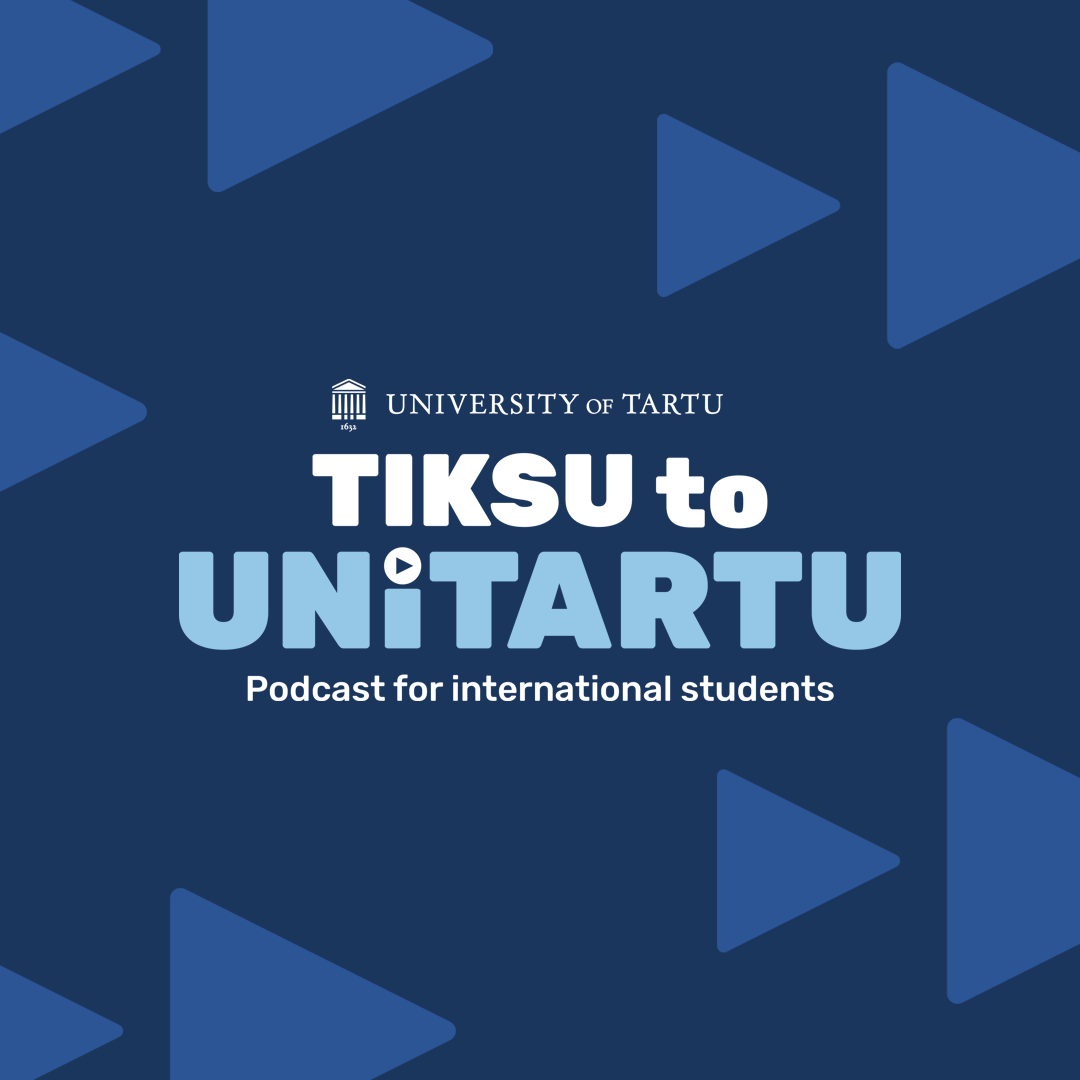Business Administration
Bachelor's
2 January
15 April
30 May
1 September
- The Business Administration bachelor's programme is one of the two most highly assessed specialisations across the University of Tartu based on student satisfaction with the programme. Find your path during your studies – our courses, student clubs, projects and professors support your journey.
- The University of Tartu belongs to the top 350 universities in the world (see Rankings and Surveys).
- Studies cover all significant business administration areas, from economics, finance, marketing and management to technical skills.
- The entrepreneurial study approach helps you create your own startup, and UniTartu Ventures provides many opportunities. In collaboration with the private sector, various programmes and incubators help to bring your idea to life, e.g. Science to Business programme (read more here).
- An international learning environment is the perfect opportunity for networking and finding a group of friends for life. Study at the University of Tartu Delta Centre, which brings together a vibrant community of students, researchers and innovators in computer science, business and economics, mathematics and statistics.
Bachelor of Business Administration (BBA) is a 3-year full-time programme preparing students for successful entry to the international or local labour market and further studies. The programme aims to develop a thorough understanding of an enterprise and its environment. It covers all significant areas of business administration: business law, management, economic policy, accounting, finance, marketing, ethics, human resources, global economy, innovation and research methods.
Studies involve analysing real-life cases, lectures by company representatives, group work, home assignments that engage several courses at once, company visits, drafting a business plan, etc. Students are also expected to complete an internship in companies. A wide-ranging curriculum enables students to continue on the path they prefer the most after graduation.
Why study business in Estonia?
- Due to its geopolitical position, the Estonian economy has always been very international and linked to the global economic community.
- Estonia has the most startups and the most unicorns per capita in Europe. As of 2024, Estonia has been the birthplace of 10 unicorns: Skype, Playtech, Wise, Bolt, Pipedrive, Zego, ID.me, Gelato, Veriff and Glia.
- Estonia is one of the most dynamic and innovative regions in the European Union, known for its modern IT solutions and communication technologies.
- Many globally successful businesses like Bolt, Skype, Playtech and Ericsson are located in Estonia.
- The University of Tartu is the forerunner of business education and research in Estonia, focusing on providing high-quality business education in the rapidly changing global economic situation.
The Business Administration programme is quite versatile for me. It provides fundamental knowledge in various fields, allowing you to choose what interests you most in the future and specialise in that particular area. This is crucial for your future career, as you will have a comprehensive understanding of all areas and be eligible for various positions.
Extracurricular activities
In addition to the study programme, you can join several practical programmes to support your development, grow your network and learn from international mentors worldwide.
- BBA students are often involved in the AIESEC network and participate in the annual Student Startup camp. Open lectures ranging from the power of improvisation to policymaking in the EU are held regularly by the university.
- CDL (Creative Destruction LAB, read more here) brings together experienced founders of unicorns, and together with world-leading experts, you will help scale innovations underpinned by the digitisation of human societies. You can gain valuable insights from the leading experts and startup ecosystem as a student. Students can polish their future tech and marketing skills and work directly with the startups they like to help them scale up quickly. You can take Creative Destruction Lab (CDL) courses besides your primary curriculum and expand your network even more.
- Wharton Global Course (read more here) is a collaboration programme between the University of Tartu, the Wharton School of the University of Pennsylvania and the Stockholm School of Economics in Riga. You will explore how these nations have transformed their economies and policies by prioritising digital innovation, entrepreneurship and technology commercialisation. Our students benefit most from expanding their international network and learning about Estonian and Latvian unicorns and other fast-growing companies by solving their practical business problems. This way, we bring value to students and local companies in Tartu. Our partners have included, for example, Bolt, Pipedrive, NPV, Cybernetica, Foxway, and others. You are very welcome to take these courses while studying here.
- We have also been taking the lead in organising the most start-up-minded business festival in the Baltics – the annual sTARTUp Day (read more here) and Delta Trends Day (read more here). You can help us organise this event while you are studying here. You can start with simple tasks and advance to international communication and organising specific side events.
Estonia and Tartu
Estonia’s society is based on contemporary science and technology. It has become one of the most entrepreneurial and advanced digital societies in the world, and it is also a success story of economic development in New Europe. Did you know that we are the country with the most unicorns per capita?
We are surrounded by the offices and R&D centres of many startup and technology companies – Bolt, Pipedrive, Nortal and Playtech – to name a few. You can learn about these companies, visit them during your studies, and perhaps get a job there!
Estonia is famous for its startups, so it is a perfect fit for students with business ideas and the desire to implement them in real life. Here in Tartu, we have a very strong local community, and we are the most startup-minded city in the world.
We work closely between the faculties of the University and Tartu and with our local community, partners and companies.
Programme highlights in media
- Watch the programme director talk about the bachelor's programme in Business Administration during Virtual Open Day 2024.
- Watch Alumni Talks: How to stay focused and challenged by Mairis Gailums (BA in Business Administration).
You will receive a Bachelor of Arts in Social Sciences (BA) degree upon graduation.
Curriculum version:
More info: Study Information System
School of Economics and Business Administration
The School of Economics and Business Administration (SEBA) is part of the Faculty of Social Sciences, with a history of more than 75 years of teaching business and economics. It has a leading role in Estonian economic and business education with internationally qualified and experienced staff.
SEBA is Estonia's top research centre in economics, international business and management. The school aims to provide a vibrant research environment linked to international centres of excellence and produces high-level academic and policy-relevant economic analysis.
SEBA is located in the University of Tartu Delta Centre. The University of Tartu Delta Centre brings together a vibrant community of students, researchers and innovators in computer science, robotics, technology, mathematics, statistics, economics, management and business. The centre combines learning, excellence in research and the challenges of business and society, creating innovative solutions for economic and social progress.
Read more about the School of Economics and Business Administration here and the University of Tartu Delta Centre here.
Dormitories
The dormitories are located close to the university buildings, within a short walking distance. The same goes for all other necessary places, such as gyms, restaurants, shopping centres, and museums. Read more about the dormitories here.

Visit us virtually
Explore Tartu, the School of Economics and Business Administration, and student dormitories through the university's virtual tour here.
After graduation, students have a wide range of possible career choices and opportunities in Estonia and other countries. Thousands of the School of Economics and Business Administration graduates work successfully in private businesses, hold influential positions in public companies and institutions, or have continued in academic careers worldwide, incl. many outstanding business and political leaders, notably Mr Siim Kallas, former Vice-President of the European Commission.
After completing the Bachelor of Business Administration degree, there are also opportunities to continue at the master's level at the University of Tartu:
- Innovation and Technology Management (read more here)
- Quantitative Economics (read more here)
- Contemporary Asian and Middle Eastern Studies (read more here)
- Entrepreneurship in Economic Policymaking (read more here)
The programme’s strong focus on entrepreneurship helps you focus on building up your own company. Read here the story of Business Administration students on how they combined the knowledge of their studies into their company, the investment platform Investonian.
Internship
Traineeship is part of the studies in the Business Administration programme. Our students have successfully done their traineeships in many different companies both in Estonia and abroad. Some examples from Estonia and beyond include banks like LHV, SEB, Swedbank, and Ziraat Bank Georgia; cultural institutions such as the Estonian National Museum, University of Tartu Art Museum, and Black Nights Film Festival; legal companies like Dilaw Attorney-at-Law Ltd in Finland; tech companies like ABB, Bolt, Playtech Estonia, Stora Enso, Hitachi Energy, and Tallink Silja, Delfi Media, Wise IT, Nordic Metrology Science and SEBA Neuromarketing Lab. Based on our students’ experience the traineeship and career options are endless when studying Business Administration.
The University of Tartu helps the students to find an internship. In particular, we have provided the students with a list of possible places (companies and other organisations) for practical training in Estonia and the other Baltic States. The internship mediation page FUTULAB has also been created (see more here). However, students have to apply for the internship themselves. The internship can be taken in any country, given that it matches the profile of the study curriculum. One can apply for funding from the Erasmus+ programme when taking an internship abroad (read more here). The University of Tartu has also offered some internship opportunities, either as part of the work for some research projects of the School of Economics and Business Administration or at the University of Tartu Centre for Applied Social Sciences (see more here).
Alumni insights
The three years I spent studying Business Administration at the University of Tartu were transformative and memorable. I was initially drawn to the programme for its practicality and opportunities. While some courses felt too easy and others overwhelmingly difficult, I made it through. The teaching staff played a significant role and I cherished the relationships I formed with the people around me.
Tartu taught me self-awareness, resilience, and the value of being outgoing. My involvement in tutoring, event photography, podcasts, and public speaking enriched my journey. These experiences prepared me for my current career as an executive clothier and helped me understand who I am and what I want to achieve. My advice is to be present, greet others with a smile, and embrace opportunities – the warmth you give will return to you.
I chose the Business Administration programme because it aligned the most with my interests, and it is suitable for a wide range of roles, allowing you to pursue careers that may change with your interests over time. The studies helped me narrow down what I was most passionate about.
I enjoyed the study experience at the University of Tartu. The Delta building is modern and comfortable. Although the studies were sometimes challenging, it was good for personal development. I pursued my career at LHV, and now I work at Nasdaq Tallinn as a Trading and Surveillance Specialist.
Tartu is a student city and a great place to study. I enjoyed how many events were organised for students and the nightlife. I was surprised at how quickly I felt like a local, seeing friends and acquaintances almost every time I went out. I became good friends with a few of my course mates with whom I still stay in contact today.
Since my final years of high school, I started to see that a strong foundation of entrepreneurial and marketing skills and an understanding of business environments are rapidly gaining more significance in a modern, fast-paced world. Therefore, my burning desire to study business administration was kindled through the valuable opportunities it gives a student to acquire a detailed knowledge of business disciplines. The programme focuses on all major functional areas of business and integrates practical learning as part of the studies but simultaneously leads to many possibilities and career paths for future professional growth.
Admission requirements for Business Administration
- secondary education – please see our country-specific document requirements
- online entry test in Mathematics
- English language proficiency – please see our acceptable tests and exempt categories
NB! The restrictions for the citizens of the Russian Federation are specified here.
Applications are evaluated based on
- the score of the motivation letter (yields 60% of the final score)
- online entry test in Mathematics (yields 40% of the final score)
The motivation letter must be submitted with your online application by April 15 at the latest.
Please write a brief motivation letter (in English, maximum of 4600 characters with spaces) based on the following points:
- give an overview of your objectives and motives to study Business Administration;
- explain why you choose the University of Tartu as a study place;
- describe linkages between your previous studies and/or if relevant also of your work experience and the programme of Business Administration;
- describe your career perspectives after completing the programme of Business Administration;
- describe how you are planning to finance your Bachelor's studies in Tartu;
- provide other relevant information that you consider we should know about you or your studies.
Evaluation criteria:
- reasoning in describing the objectives and motives to study in the programme (max 40 points) - assessment of applicant´s objectives and motives to study in the programme, reasons for choosing the UT School of Economics and Business Administration, description of career perspectives after completing the programme and other relevant aspects regarding choice of the programme;
- linkages between earlier studies and/or work experience and the Business Administration programme (max 20 points) - assessment of applicant´s ability to link the previous education (including academic activities) and/or work experience to the study programme;
- argumentation skills (max 40 points) - assessment of applicant´s skills of argumentation and discussion as presented in the written text, including logicality of the structure of the letter, relevance of the information and arguments presented and abilities of self-expression in the written form.
The maximum score for motivation letter is 100 points and the result is positive only if the applicant gains 51 points or more.
The entry test aims to assess competencies in mathematics. It is an online test taken on the UT tests platform (www.testid.ut.ee) between May 19 and 23, 2025, and it can be completed only once. The test contains high-school mathematics: algebraic and trigonometric expressions, geometry, functions and their graphs, equations and inequalities, limits, differentiation, integration, and their applications. The test contains up to 10 exercises that shuffle within questions. There are mixed-type exercises, containing dropdowns, radio buttons, and checkboxes, as well as input boxes for algebraic expressions and numbers with or without units. Every candidate will obtain a random, unique selection of exercises with random parameters.
The total time limit is 120 minutes.
The applicant should be prepared to have paper and pencil at hand while taking the test to perform some intermediate calculations.
All applicants are responsible for the quality of their internet connection. Before starting the test, updating the web browser is required. Once interrupted, the test cannot be concluded.
All test takers receive a total score without individual feedback on each question. The maximum possible score is 100 points. The minimum positive score result is 51 points.
Usernames for entering the Moodle platform will be sent to qualifying applicants a few days before the test.
Only those applicants who score 66 points or higher (out of 100) as a combined score from both the motivation letter and the entry test will be considered for admission.
For further information on assessing candidates´ academic performance and calculating admissions´ score see here.
How to apply
The following information applies to international students and Estonian students who graduated abroad:
The application system opens on 2 January and closes on 15 April. The following documents must be submitted electronically via DreamApply by the application deadline:
motivation letter
official certified copy of the secondary school certificate and grade list in the original language (must include a description of the grading scale). NB! Applicants graduating in one of the the member countries of EU, OECD, CIS (СНГ), Ukraine, Georgia, Moldova, IB Diploma programme or graduating with A-level exams in the upcoming spring/summer and having their secondary school certificate issued later than the application deadline should electronically submit their most recent grade list (grades for all your high school years up until the moment of application) by the application deadline, 15 April. The grade list should be supplemented by an official statement from the issuing school indicating current enrolment and expected graduation date. Admitted candidates are required to post the certified copies of their graduation documents as soon as these have been issued (these must reach us by the end of July at the latest).
NB! Applicants from other countries can only apply if they have already obtained their final graduation documents and can submit these by the application deadline, 15 April.official certified translation of the secondary school certificate and grade list into English. As certified translations, we consider 1) official translations made by the issuing institution (school, exam centre, etc.) bearing their original signature, stamp, etc., or 2) translations certified by a sworn translator or notary.
copy of valid international passport page stating the applicant’s personal particulars
confirmation/receipt of application fee payment (if applicable). All international applicants are required to pay the application fee EUR 100, unless they have Estonian citizenship and/or have completed their previous study level in Estonia. An application will only be processed after the fee has been received by the UT.
Submitted applications can not be edited. It is only possible to upload new documents (e.g. graduation certificates). Applicants will receive feedback and notifications through the DreamApply system to their e-mail. Incomplete applications or those submitted by e-mail will not be considered for admission.
Guide to submitting an electronic application on DreamApply.
NB: The University of Tartu has no official partnerships with agents or educational representatives. We strongly recommend applying directly to the university without the help of unauthorised third-party entities. Should you use such a service, please ensure that your application's contact information is your personal details (your e-mail, phone number, etc.).
The evaluation of applications will be made based on the electronic copies added to DreamApply. A general ranking list will be formed based on the electronically submitted applications and admission results (including offers) will be announced to all applicants personally via DreamApply by 30 May at the latest. Admitted candidates are expected to accept or decline the offer in DreamApply in 7 days. If the decision is not communicated to UT via DreamApply by the stipulated deadline, UT reserves the right to withdraw the admission offer.
NB! It is not possible to postpone/defer the beginning of studies to the next academic year.
Terms and conditions of the admission offer
Admission offers are conditional. This means that there are conditions in the offer which the applicant needs to fulfil in order to be admitted (e.g. sending application documents by post; obtaining the required level of education). If the conditions are not met, UT has the right to withdraw the offer. Also, UT reserves the right to withdraw or amend any offer or revoke the matriculation of a student, if it becomes evident that the application contains fraudulent information, the qualification does not provide access to the chosen study programme or the student is found to have omitted key information from the application. Should such circumstances occur, UT will not be liable for any material or immaterial loss which the student may suffer as a result.
Once the admission results have been announced, all admitted students are required to send the application documents by post to: Student Admissions, University of Tartu, Ülikooli 18-133, Tartu 50090, ESTONIA.
The documents are expected to be mailed only by those receiving the admission offer (unless instructed otherwise by the Admissions staff). The documents must reach the university within 3 weeks from the announcement of the offer. If the application documents do not reach the UT Student Admissions by the deadline, UT has the right to withdraw the admission offer. Applicants will be informed via DreamApply when their documents have arrived.
Requirements for educational documents
All copies of educational documents (secondary school certificate and grade list/transcript) must be officially certified. By certified we mean that the copies should bear an original signature and seal of the authority certifying that these are true copies of the original document(s). The copies can be certified either 1) by an authorised official of the issuing institution, or 2) by a notary, or 3) with an Apostille attached. NB! Country-specific requirements may specify the way documents from certain countries must be certified. Please note that UT does not accept simple copies made on the basis of already certified copies (primary copies are needed).
All admitted students are required to present their original qualification certificates upon arrival (unless these were sent directly from the issuing institution).
Paying the tuition fee (applicable to those receiving a fee-based study place offer)
- EU/EEA/Swiss citizens are required to pay the fee for the first semester once they arrive in Tartu (by 20 September at the latest after signing the fee contract, please read more here).
- Admitted students from other countries are required to pre-pay half of the first semester's tuition fee. The invoice along with the pre-payment deadline and payment details will be sent to applicants via DreamApply after they have accepted the admissions offer and the University has received the hard copies of the application documents. Second part of the fee is due on 20 September. NB! The official admission letter (necessary for visa application) will only be issued once the University of Tartu has received the pre-payment.
- NB! Once you have been offered a fee-based study place, be aware that it will not be changed into a fee waiver study place. By transferring the pre-payment to the university, you confirm that you have informed yourself about the process of the visa and temporary residence permit application and you are able to arrive in Estonia by the start of the academic year. If you have any questions please contact studentvisasupport@ut.ee.
The official admission letter will be sent to admitted students electronically via DreamApply only after the admissions office has received and reviewed hard copies of the application documents, and received the tuition fee pre-payment (if a pre-payment was required, please see Step 3 for more details).
NB! The electronic admission letter is also sufficient for non-EU students for applying for visa/residence permit in Estonian embassies.
Once the admission letter is issued, accepted students may proceed further with arranging their arrival. All non-EU students should first consult information on the process of visa and temporary residence permit application to be sure, as where and when the relevant documents need to be applied. Note that housing at the UT dormitories can be applied during a limited period of time, unless specified otherwise on the website.
NB! Admitted students who are not citizens of an EU or EEA country or Switzerland need to make sure they obtain the Estonian long-term visa on time in order to be able to participate in the orientation programme for international students held in the last week of August. They are also required to visit the Admissions Office in person to complete their arrival registration by September 1, 2025, at the latest. Failure to do so will result in the revocation of their admission decision and visa.
For housing alternatives, please find further information on Tartu Welcome Centre website.
Travel information can be found here.
Based upon common queries, the most important information has been summarised into a pre-arrival information website UT Getting Started.
Estonian applicants should apply via National Admission Information Systems (SAIS). Further information in Estonian is available here.
Contacts
Ask about the admission requirements and application process
Find out what awaits you at UniTartu

Join info events
Learn more about the university and its study programmes by attending our info events for future students. Our staff also attends international fairs and info sessions.

Spend a day as a student
During the academic year, you can spend a day with a current student in your field of interest, giving you a firsthand look at student life and the University of Tartu.

Listen to the podcast
The "Tiksu to UniTartu - Podcast for International Students" covers topics such as housing, student organisations, healthcare, etc.

Visit the campus
Visiting the campus gives you a great understanding of what it would be like to study here. You can visit us throughout the year.

07.02.2025










